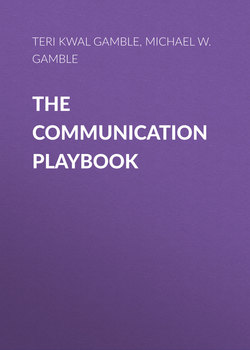Читать книгу The Communication Playbook - Teri Kwal Gamble - Страница 208
На сайте Литреса книга снята с продажи.
Words and Power
ОглавлениеAlthough we may not realize it, some of us announce our powerlessness through our word choices. If we speak more indirectly than is expected, people could perceive that we lack self-confidence and power. In contrast, those of us perceived to be “powertalkers” make more definite statements, such as “Let’s go out to dinner tonight.” Powertalkers direct the action. They assume control.
Typically, powertalkers hesitate less in their speech, enhancing their sense of self-worth by projecting their opinions with more confidence. They eliminate fillers, such as “er,” “um,” “you know,” “like,” and “well,” which serve as verbal hiccups, making the speaker appear weak.
Powerful talk comes directly to the point. It does not contain disclaimers (“I probably shouldn’t mention this, but . . .”) or tag questions (like those described in the section “Gender and Speech Style”). When you speak powertalk, your credibility and ability to influence others usually increase. Changing the power balance may be as simple as changing the words you use.
Talking powerfully is also less risky. According to Deborah Tannen, speaking indirectly in some situations actually causes problems. She cites the following conversation about de-icing between a pilot and co-pilot as an example of its dangers:
Co-pilot: Look how the ice is just hanging on his, ah, back, back there, see that? . . .
Co-pilot: See all those icicles on the back there and everything?
Pilot: Yeah . . .
Co-pilot: Boy, this is a, this is a losing battle here on trying to de-ice those things . . .
Co-pilot: Let’s check these tops again since we’ve been here a while.
Captain: I think we get to go here in a minute.58
Less than a minute later, the plane crashed. While the co-pilot, probably because of his lower status, had tried to warn the pilot indirectly, the pilot failed to act on the cues. Indirectness, it seems is easier for higher-status persons to ignore. As a result, flight crews are trained to express themselves in more direct ways, and pilots are taught to pick up on indirect hints.
Language influences power in another way as well. According to Cheris Kramarae, because language is invented, it does not offer an adequate vocabulary to describe the unique experiences of all members of all groups. In other words, language does not serve all speakers equally well, usually meeting the needs of the powerful and wealthy more than the needs of women or members of less powerful groups, such as the poor, persons of color, or the physically challenged.59 Kramarae contends that because men created words and established norms for their use, it is more difficult for the members of other groups to express their experiences.
In effect, the lack of appropriate means of expression mutes members of nondominant groups. Although this is not to suggest that the members of a muted group will always be silent, they may need to find new ways to encode their thoughts so that others understand them. As new words enter our vocabulary, however, it becomes increasingly possible for experiences, once difficult to give voice to, to enter the public sphere. Thus, terms such as date rape, sexual harassment, and glass ceiling helped change the nature of our discussions. In contrast to Kramarae, sociolinguist Deborah Tannen believes that men were not necessarily trying to control women. Rather, Tannen feels that the different communication style preferences of men and women may have contributed to resulting power imbalances.60 What do you think?
